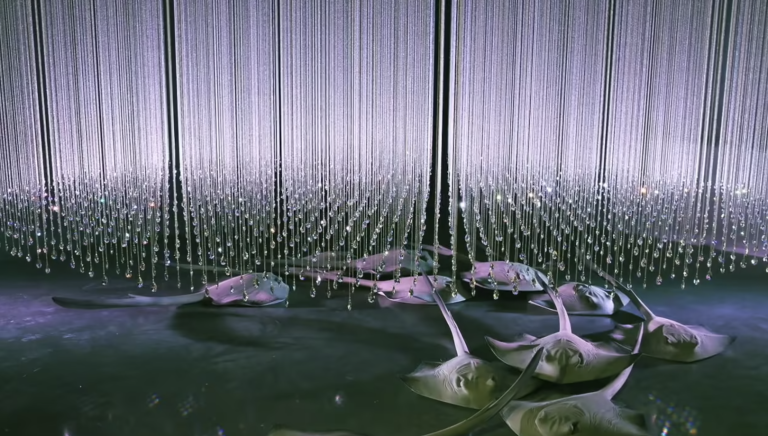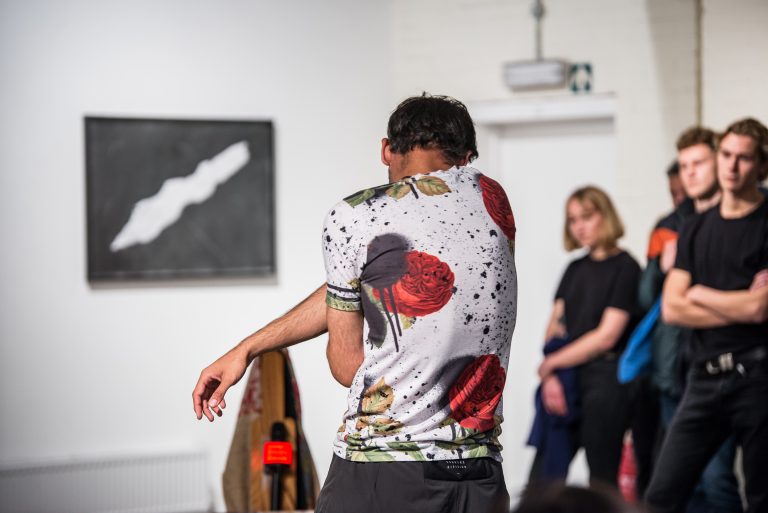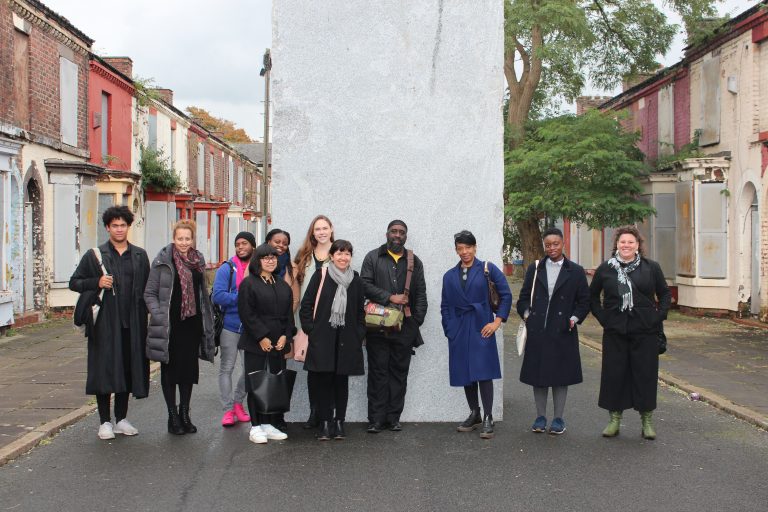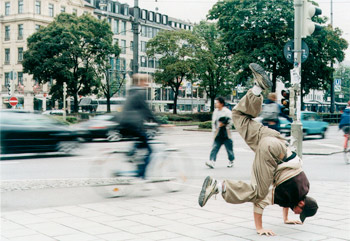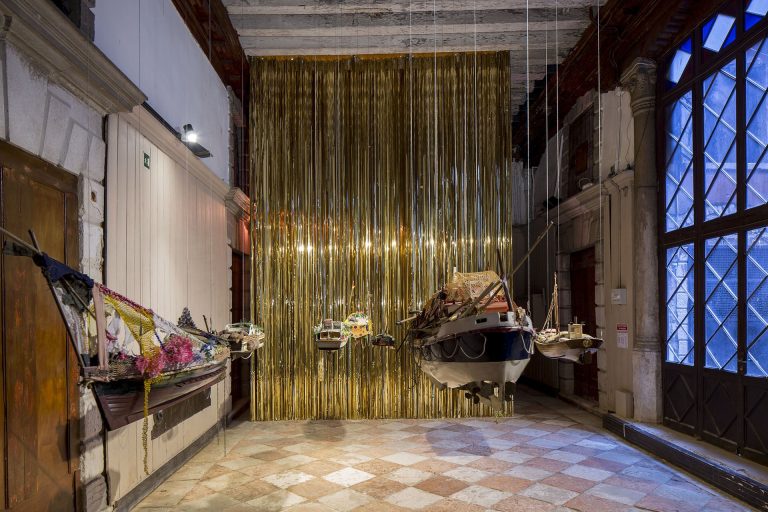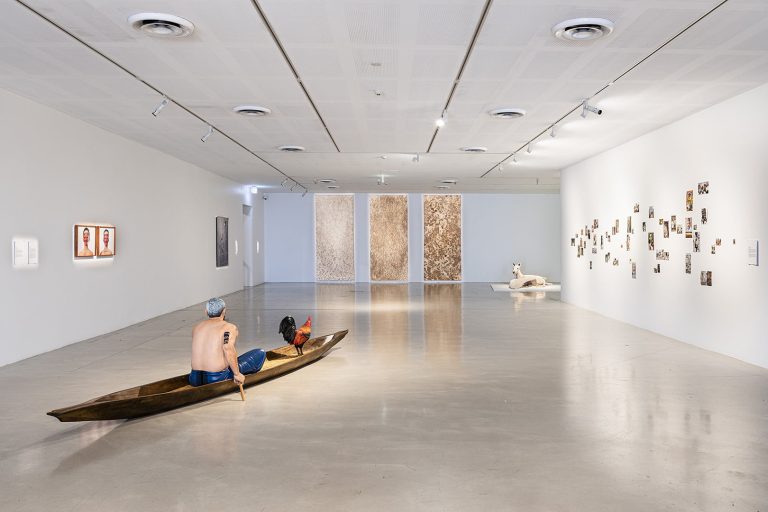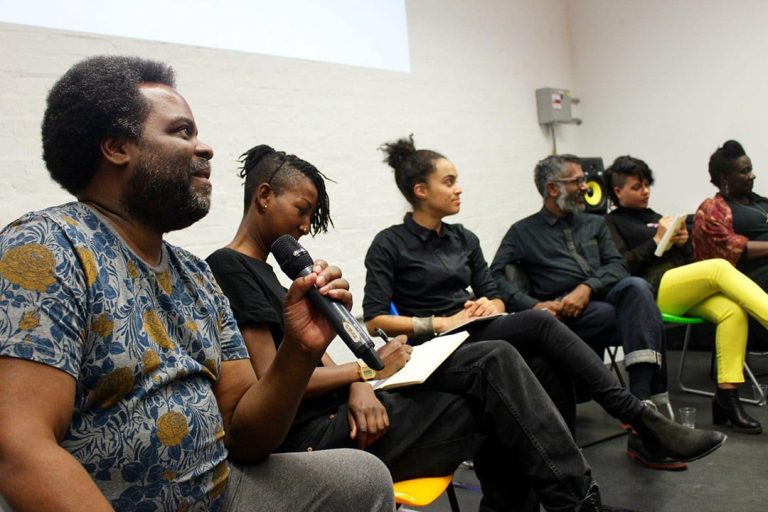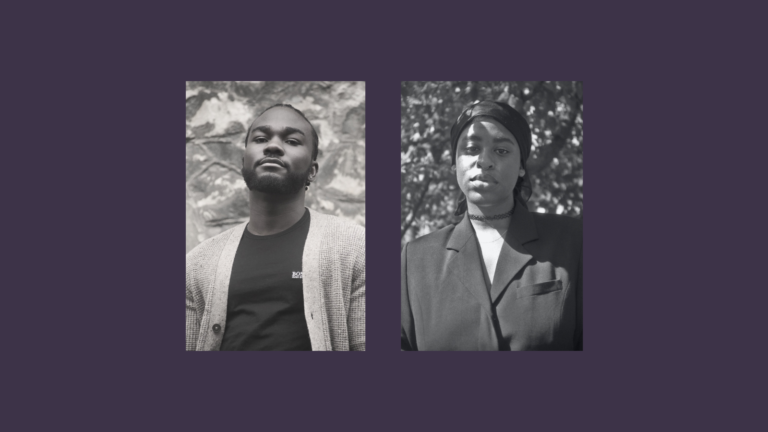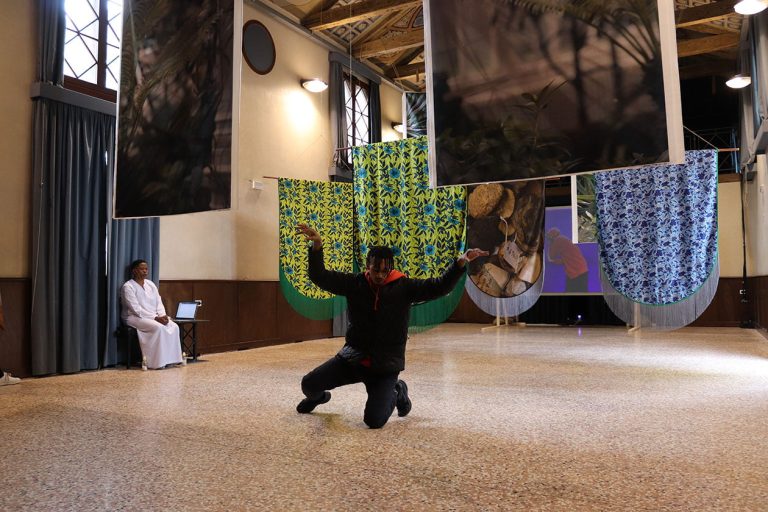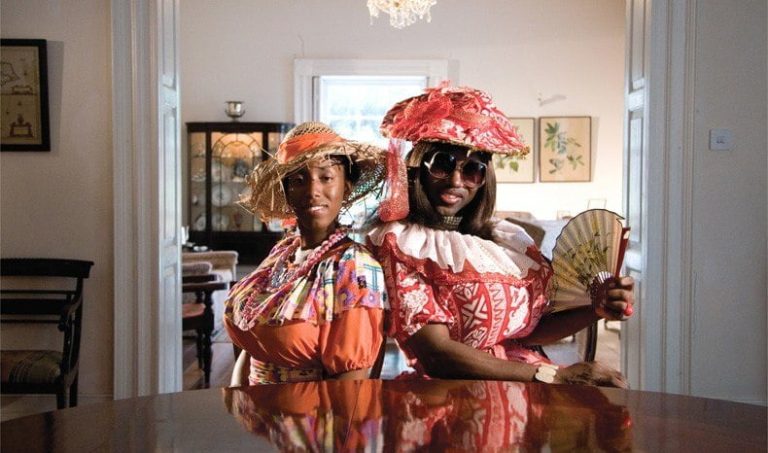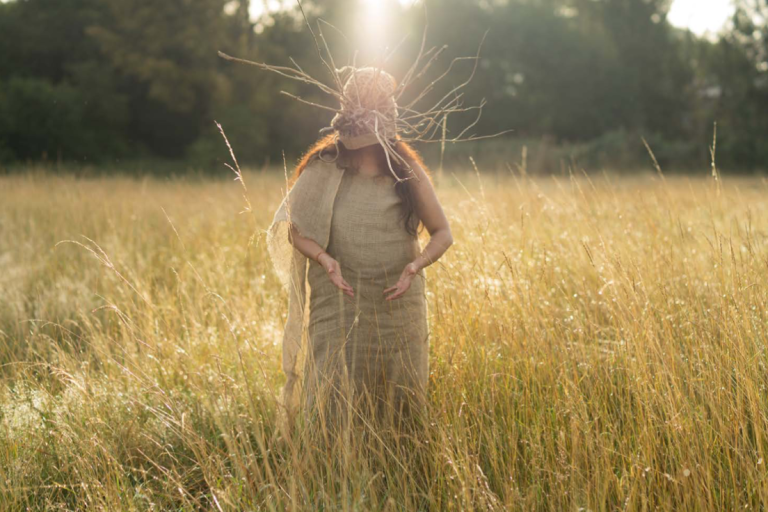Reckoning: Exodus Crooks and TITANESS aka Maria Joranko & Tiffany Wellington in Conversation (Transcript)
17 Sep 2023
Project:
Location:
ICF @ Block 336, London
Location:
ICF @ Block 336, London
This conversation marked a collaborative event, titled Reckoning, bridging together two exhibitions in Brixton:
Epiphany (Temporaire) by Exodus Crooks, curated by Orphée Kashala, commissioned by Ort Gallery and ICF, and presented by ICF as part of our 2023 residency at Block 336
(26 August – 17 September 2023)
Love is a state of mind by TITANESS aka Maria Joranko and Tiffany Wellington at San Mei Gallery
(8 September – 4 November 2023)
Watch Video
_________________________
Orphée Kashala: Thank you, everyone, for joining us today for Reckoning. It’s a very, very exciting and interesting talk between Exodus Crooks and TITANESS. I can’t wait to hear about the practices of these incredible artists. We are very fortunate today to see their respective works in the two shows across the two galleries. I’m Orphée Kashala and I’m a curator. I was really blessed and fortunate to curate this show at Block 336 [commissioned by Ort Gallery and ICF].
So, I just thought maybe we could start by talking a bit about the title we chose for this event, which was Reckoning. You know, what that means for you guys, because I remember when we were coming up with the titles, I thought of Reckoning because there was an interesting kind of overlapping theme of heritage between your practices and that relationship to it. I don’t want to reveal too much. And I would love to hear you guys talk about it again. So maybe we can start with you, Tiff. What does Reckoning mean to you?
Tiffany Wellington: I think that, for me, it’s looking back, and recognising the history and who you are. Realising that actually there is a bit more to me than this kind of pathway that I made myself from. I feel like it’s such a deep word, to reckon with yourself, it’s a long form. Who you are, who you are going to be, you know?
I think in regard to the exhibition that me and Maria have worked on [at San Mei Gallery], we reckoned with ourselves a lot. Changing how we work and becoming flexible, and super driven into producing something that we can imagine. So, you know, that’s kind of what Reckoning is for me.
Maria Joranko: Yeah, I think that’s a hard question because it can be external or internal to reckon with something. In regards with the internal, to bridge it off of what Tiff said, because I do feel sometimes there’s a lot of like – when you reckon with things, a lot of the times it’s like an internal reflection process, like you reckoning with who you are. But also, I think, personally for me, because I also have a very mixed heritage, a mixed background – it’s also reckoning with what you are and all the things that have happened that shouldn’t have happened, but that you are now a creation of this. And so, how do you reckon?
I think of it in a relationship with the word reconciling because there’s nothing you can do about what has happened to make you. You have control over what happens next, in some forms. You have agency over yourself and what goes into that. You have to reckon with all those choices that you make every day, whether you feel good about them or not. And as Exodus said, that messiness is part of it. And I’m a really messy person, not intentionally all the time, but I have to reckon with that and what comes next. And what happens with my own mental, emotional and physical health, stuff like that. And that’s it for me.
Exodus Crooks: Yeah, I’m sort of just digesting because obviously there are going to be a lot of parallels today, that’s kind of why we have done this. But just to sort of add on, rather than replace what you guys have said. Reckoning for me has been confronting the unseen. And so, Tiff, when you said, it’s like looking backwards – I think for me, it’s been that and looking inwards, as well.
I mentioned this earlier, it’s like, what happens when you are all alone. And just coming to terms with that and being okay with not just looking at myself in the mirror but looking at my shadows. What happens to the unseen? Looking at the unseen. Looking at things that aren’t so obvious and yeah so…
Orphée: Wonderful. Yes. I think it’s so beautiful how you guys are able to talk about reckoning without even touching on the point I was trying to make. Let’s talk a little bit about that. Let’s talk a little bit about the heritage because it is quite present in your practices. I mean, even in both shows as well. So, I’m thinking maybe we can start with Maria, can you tell us a bit more about heritage in your practice?
Maria: Yeah, I mean, I find that like a difficult question because my last name is Eastern European, but my mother is Guatemalan. And that’s the parent that I grew up with most of my life, with, you know, with my grandparents who are very Midwestern American, but also not, because they’ve come from other European cultures as well. My grandfather is Eastern European and my grandmother, a very German family. And so, looking at my mother’s family who is in another country. I see them every now and then.
Thinking about that with my work, it’s very difficult to find sometimes grounding within yourself in that because it’s like, well, who am I? What am I? Because I don’t fit within strict lines and expectations of one identity to another. And when you look at the historical elements or every time my mom drops a bomb about the family or my grandma slips in something, I’m like, shit. So basically, that’s the reaction. And it gives you something to reckon with about where you’ve come from.
And in my practice, I think about how that also occurs on a biological level because your body – I have an autoimmune disease and that’s commonly found in Eastern European males, so I blame my father’s family for that. And thinking about all those different things and how our bodies are adapted to certain ecologies and then how we move as present bodies and adapt to new ecologies, while still having these other immunities and embodiments from the past.
How does that come through? In so in our work as well, we touched upon these other ecologies, of, like, rainforests. How the UK used to be a rainforest. What’s reckoning with that past that’s happening here. We come from countries that are also very rain forested and how are these connections coming? How does your heritage play into these different places that you’re inhabiting, that are very, very different, but also have a lot of similarities? And how do you walk through that? And again, reckon with yourself. Being like, well, what am I? Who am I? But I’m here, so I’ve got to do something with it.
Tiffany: I guess it’s also like leaving your mark, or our mark, in this space, in this climate, that we are currently in. And I guess I can talk about my heritage as well. I was born in Jamaica, but I grew up here, I moved here when I was four. And so, I have, I don’t know – I guess most people know that Jamaicans are very nationalistic, and we are so proud. We wear the flag and everything. We are not shy or scared of wearing a flag, compared to other countries. Especially like in the West, you know? And I feel like that nationalism is seen as okay because it’s pride in that generation.
And it’s pride in that culture that’s developed in that tiny island that so many people recognise. I’m working with that heritage and it’s such a big heritage. Sometimes I feel like there are so many things that I need to think about and discuss and bring forth, especially in my work. How do I bring in this little thing that I just know that only certain people, like a handful of people can understand. Going back to what you were saying about hanging the washing line. And I was like, that’s literally it. I was like, oh my God, I got this. And it’s quite a big thing with people who share a similar background with you, you just recognise that aspect of detail. Which is not necessarily talked about, but you still understand it.
I mean that is such an interesting thing about heritage, it’s also shared. It’s just not – it’s not linear within you, there’s other people, there’s other bloodlines. It’s a tree. Yeah, it’s tree. It is very ecological, as well, and it’s always growing. Because we are going to leave this heritage as well, our background, our history, that’s going to be in the future. It’s very open.
Exodus: There’s a book that I carried with me on this trip, actually this weekend, and it is very heavily annotated. It is called Art on My Mind by bell hooks. Some people, probably, I imagine, probably know of it. If you don’t, it’s a really great book to read. But it starts off – at the front of the book it says, “the diasporic is an act of will and memory”. And I kept circling it, like almost ripping through the page, just because I think in terms of heritage, that’s what my experience has been. And a lot of people of my generation, probably in this room, I know for sure, are having these very recent acts of homecoming.
There’s been a lot of people that recently have been going, whoa, this can’t be my home. Especially if they know they’ve got family that’s from another country. Something happens at one point in your life, when there is a breaking that happens. And you go, I’m going to go looking. Especially if you are born here but your family’s from elsewhere. You feel the tearing within you. And so, there’s this – for me, anyway, there was a tearing of and a loss and a sort of I need to look inwards. I need to search. What do I remember? What do I feel? And I’ve been sitting in the British-Jamaican sort of limbo. I went looking and I haven’t really stopped looking since. And that is not to say that everybody owes that.
Everyone doesn’t have to go looking. You don’t have to. But for me, it felt like I needed to mend that tearing that’s happened. And also, just especially with my grandparents being quite a significant part of my life and them being Jamaican, I was like hold on a minute. I understood things of the land that I’d never been to. And so that created such a strange thing happening within me. And I would say the turning point of really confronting that heritage was meeting my partner who is Jamaican. They have a way of being sort of like, “You don’t know about – come, I’ll show you”, you know? And so, there was that happening, as well. Of them connecting me to their world, which was my world too but in a very sort of more distanced way.
And yeah, I mean, it’s a massive conversation about heritage that we can have forever and a day. Being second generation, third generation, things get lost. Things get lost in translation. I think for me it was important that I didn’t want to lose things. I’ve lost enough. And so, I can’t lose anymore. I can’t. There’s got to be something I can hold on to and go, “this feels right”. And there’s a lot – there’s big parts of my Jamaican culture that I resonate with and other parts that I don’t. Just by virtue of growing up here, and I’m actually more comfortable with that.
And, and so, yeah, when I’m over there, I’ll get a real taxi, but I’ll get an Uber sometimes too. It’s like toying between these two cultures, I guess. And a lot of my practice does explore that limbo, that sitting on the fence, that sitting in between. Between islands, between cultures, between genders, and I like the in between. I like exploring what happens in between.
Orphée: Amazing. Yeah, it’s a journey, isn’t it? I mean, I’m on my own sort of version of a journey with heritage. It is so interesting when you talk about the generations. Because I think mine will probably be very different, as well. Coming to this country as an adult. It’s a process, right? And so, I wanted to talk about process a little bit, because there is something so interesting about your work. When you look at the swords, for instance, you can see that they’ve been through a process, there are so many steps that you took. And when you look at the wardrobe, as well, it’s the process behind having that piece finished and when, you know, it’s ready. Tiff, can you tell us a little bit more about that.
Tiffany: The process of us making the swords. It was a very tedious thing. They are so delicate but also very strong. And how we made it, we were learning. It was the first time I’ve worked with wax, actually. I think you…
Maria: I have only worked with beeswax, but not like this.
Tiffany: It’s different materials that we tried to bridge together and worked in some way. That’s because the materials were all organic anyway. And so, obviously, were going to work, and work in our favour. It was a lot of, very tedious waiting, testing and experimenting and trying to mesh it all together so it becomes this cohesive kind of language. Yeah, I feel like we’ve achieved in the sense of those physical sculptures.
Maria: Yeah, there was a lot of talking between the two of us as well, like a lot of externalising everything, because, as much as I wish you could, Tiff can’t read my mind. And I can’t read her’s either. And so like, whatever thoughts we’re having about, you know, or at least for my part, whatever thoughts I am having about it – like, I have to say them, I can’t just keep it in my head the entire time. I have to say it to someone and be like, well, do you think? What do you think? Like, does this help or hurt?
Tiffany: Which I think is a quite different process, in terms of your work, Exodus, especially since you were looking internally. We had to work externally, just to be able to, I guess, communicate where we wanted to go with our pieces.
Exodus: We all met [gesturing to the panel] – we did a Zoom meeting first before we embarked on this journey together. And one of the things that I was really intrigued about was, I remember asking you, do you have a curator or were you the curator? And they were like, “yeah, we are the curators”. So, for Maria and Tiff, they’ve worked very intimately together, collaborating in a way that I could relate to, but sort of not, as well.
Orphée and I, I’ve been the artist and he’s been the curator. But actually we’ve worked in such an intimate way that there was a mirroring in terms of collaboration. So yeah, there was a very inward journey. There’s a person that works for ICF and their partner came to the opening. They said, “It feels like I’m looking into the artist’s solitude”. And I was like, yeah, it has been. That’s kind of how I work anyways, there is this kind of solitude happening. But actually, working with Orphée meant that there were so many moments where I had to say, “I don’t know how I feel about this or I’m nervous. Or what are you thinking? Are you worried about that too?” And we just were able to come together. And for the first time in my practice, I had someone else that I could kind of panic with, and worry with, and laugh with, and be excited with.
That changed things too, I guess so, yeah. Just admiring how you guys worked together while reflecting on how that looks with different roles, but with a similar sort of intimacy. And then just trusting that all the stuff that were within me, that someone else can validate that. Because something happens is you – if you studied art, as well, or you did art in any sort of institutional capacity, you are used to getting this sort of validation. And you used to get it from a teacher, an assessment, or there’s something where someone is going “good job” or “bad job”. But as someone outside of education, as a practicing artist, you are not getting that from anyone. Unless you are in a collective. You are not getting someone go, “this is really great”, or “I’m interested in that”. You’re just making and hoping that it touches someone somewhere or does something.
So having Orphée really sit with certain works and go, “I love that”, or “Yeah I like this, but can we do this” was really validating for me. I am someone that also has a love language of words of affirmation. I like to hear that what someone thinks, whether that’s good or bad, I need to hear that. And so, you end up just being in the studio for ages, working and not really knowing how it’s going to be received. So, it was nice to have someone that I was able to talk to. And I guess you guys probably experienced elements of that, of bouncing off each other maybe?
Maria: Yeah, Tiff is more decisive than me, so it made things much more quick, because otherwise I would sit there like, “do I actually like it? Or could I do it different or better?”
Exodus: I am going to guess your star sign later.
Maria: So, she’d be like, “No, it doesn’t work”. And I’d be like, “Yeah, she’s right”.
Exodus: I think you need that, though. You need that balance.
Maria: Yeah, I did!
Exodus: You need that balance for sure. I guess that’s the making of work. I think, generally, that is the message across the board. We live in such an individualistic way and then wonder why we’re struggling in life. And, actually, a more indigenous way of doing things is to be in collaboration constantly with each other, with people. It could be your postman, someone always delivering your post, that is an interaction, that is a conversation you could have and gain more understanding from. But we are so individualistic here. And I’m really embracing and loving the opportunity to connect with people, and say, “what do you think? And what do you feel?” And the balance of energy between you two has produced an incredible show. And, hopefully, that is the message. That when you connect more, you can create some incredible things.
Maria: I think most artists who say that they’ve done everything of their own genius is lying.
Exodus: Or it’s just crap.
Maria: Yeah, absolutely. What is really an individual name? It’s not true because you’re such a collection of all the conversations, all the feedback, like, all the different things that you’ve either read or looked at. And so it’s like, stop lying. Just acknowledge.
Exodus: But if they have genuinely done it on their own, it’s generally not that good. Wherever you live, wherever you’ve been within the world, in society, to feel those things and then put them back out. Whenever you connect with someone who inspired you. Every single work in this show – as lonely as I talk about that life can be and that solitude… Everything here is coming from me being in interaction with somebody, something.
Even the pain. Even the pain you see in the middle room is from me interacting with people, you know? And that’s why the film was so important because that was also a turning point, this is evidence of me meeting two incredible artists in Jamaica. Connecting with them. I was in Jamaica last year on a DYCP. I was only supposed to meet with one of the artists for ten days, and true to Jamaican culture, she was like, “No, come down for dinner”. Every day. Every day. And I was like, but I am only paying you for ten days, and Arts Council money, and all this other stuff. And she was like, “No, come and eat with us, come and sit and have dinner with us”. This community, this thing that happened, and now I have friends for life, and I couldn’t have made that film without them.
I couldn’t have learned what I learned without them. And I couldn’t have had these incredible moments without them. It’d be a lie to say, “oh this whole show has just been me. I’m awesome.” It’s bullshit. I actually think there’s more power in that collaboration, because you have to humble yourself, you have to open your mind to…
Maria: You have to say thank you.
Exodus: Exactly. Yeah, that’s true. Yeah.
Orphée: Amazing. I think it’s so interesting for me to listen to this because that relationship aspect of things is something that I’m more or less looking for whenever I’m working. If I’m going to get out of bed, it better be for something valuable. I find a lot of value in, you know, relationships with people. Yeah, it’s amazing. I love how you guys are so pro that. Like, let’s embrace that more. And seeing the relationship between you two. And it’s very hard for me to say who does what, and I think that’s beautiful, isn’t it?
Maria: Good.
Orphée: It is amazing. I wanted to talk about another type of relationship because I am very curious about that. With sort of the materials that you choose in your work. Because when I look at some of the pieces, like the sword. I wonder that moment when you’re making it, and it’s you and you’re choosing what’s going in there. And then you have these objects… So, that relationship with the materials, like can you tell us a bit about that? And I know, Exodus, I saw you with a bandage. That was a very tough relationship.
Exodus: Yeah, so, it’s better now. I’m not going to say touch wood, because that’s how I got ill. I’m here all week, guys.
So, I, yeah, I ended with some sort of strain, not quite carpal tunnel, or anything like that. But working with the wood, because being trained in Calabash, the material is thinner, so me sort of thinking, yeah, I can apply that to carving into anything. And it not working the same and really having that strain. I’ve carved into wood before, but not that much. And doing that full poem on that wardrobe was just such a humbling experience, because I had to just learn to do whatever the wardrobe wanted, whatever the wood wanted. And knowing how thick it was, and gauging the pressure, and if I go too deep it’s going to saw right through it. Even just understanding the really finicky stuff of it.
So, there’s this guy who is called Charles Weston, he’s an artist as well. I share a studio with him, he’s a stonemason and he taught me a lot about just the dangers of it too. And being like, “be careful you need a good mask because of all the bits of wood are going to get into you. And do this, and do that, and don’t have that, and have ear defenders.” Just all these other things to protect me from how the wood could respond to me.
But yeah, the weight and the drill, doing it over time caused me to have an injury in my right thumb. And so, I had to sort of work out, okay, am I going to do one sentence a day or two sentences a day, but then having that little panic of like, but there is a deadline. And the show’s going to open on the 25th and I need to get it done. Just understanding that, yeah, there’s art and, yeah, there’s this great opportunity to show. But also, myself, and I need to take care of myself and having that balance. And nothing’s more important or should take over your health, has been a big message that I had to learn for years the hard away. But, I think, the injuries came when I was pushing past that, as well. And me trying to push myself and push the wood. And it happened with the mistakes, too. Any mistakes I had in the wood, any time I slipped was when I was trying to go past my capacity and do what the wood didn’t want me to do.
So, there’s moments where I did slip with it. And it’s exposing. It’s like, what do you do now? That’s it. I can’t just mend it. I’ve now got this big carving streak in there that I didn’t want and having to fill that in with the plastic wood and stuff like that. But yeah, it was a big journey of technique, working with it. But the process was really… You guys said something about process… Tedious was the word you used. I did actually start to find sometimes, like there was this mundane, like, and then again, and do this and do that. Especially as I started… once I did two doors, I kind of was like, I’m done. The excitement is gone. So, to keep going and do the same thing over and over again was really interesting.
But actually, doing something mundane was giving me more ideas, because, obviously, part of my brain is resting. And it was a balance of still trying to stay alert so that I didn’t have those moments of slipping. Which happened if I was working at night. I’d sort of be like thinking about dinner and slip with the drill or something like that. So yeah, there’s a balance of the tedious with also making sure you respect the material. I guess for me.
Maria: Yeah, I think respecting the material is something that’s huge, because we definitely had to learn a lot about respecting ours, as we definitely disrespected it sometimes with the drill.
Tiffany: Also, I don’t think we used that many health and safety regulations.
Maria: No, we were like, time to disrespect ourselves for a minute.
Tiffany: It’s a lot of energy actually, to put in, to make something that doesn’t exist already. So, it’s like, okay, where do I go from here? Because we don’t know. And that’s also a thrill, that unexpected, you know, and creating something new. But in most cases, we won’t have another version of it because you’ve used your hands to make this and it’s in your handwriting as well. And it is yourself that’s in this piece of work. And then likewise, we’ve put ourselves into this piece of work.
Maria: It’s like our own embodiments.
Tiffany: And like the characters in the story… we have done as part of the performance, and stuff like that. It’s just, yeah, I guess working as an artist you put so much of yourself into it, that at times you do forget to think about your health and, do you strain yourself? But then at the same time, you have such a big passion and just a drive to continue anyway, because you just want to share a piece of yourself. So, I think that’s like always such a big part of the process. You know? That has to do with physicality.
Maria: I mean, our process was so physical anyway because we had to go on walks. And forage things and find things, and carry all these different plant matters, figure out how to move them. Ripping bark off a tree.
Tiffany: I mean it’s basically like manual labour. [Maria] Yeah, I was so sore every day. I was, you know, stretching, like this can’t go on. I can’t go on. [Exodus] They were quite heavy as well?
Maria: Some of them were heavy, some of them were really light. But even just like moving the wax, moving the material, you’re in a certain position, or even like concrete floors.
Tiffany: A small brush was used to paint the wax on certain parts of the plants, just so it could reach them. It’s a lot of different layers and unexpected things that we didn’t think we had to do. We thought, oh we can just dip those things and put them in a pot. It doesn’t work like that. They are too big for it. And I guess working, for us, was very DIY.
Maria: Yeah, for sure. And we were like, this stick has vibes, and it goes with this other stick, with other good vibes. And then like, we had this whole bowl, like a bucket of sticks. And then were like, no, that’s not it, this is not the vibe. I mean it was basically like collaging and putting things together and being like, that’s the one. I can’t explain it, but that’s the energy right there. And like being open to materials and things that you wouldn’t have expected. Even the rope handles were kind of something that was just very serendipitous. I just happened to have some rope in my studio, and we were like, “that’s the one. That’s her. Like, do it.” Which was also intense, and we burned our hands so much with the wax and glue and things like that. It was a very intensive experience in heat. And we did also set off the fire alarm.
Orphée: I have three words that I was able to sort of see in both shows and I’m going to put them out there, and you guys can choose which one you want to respond to. So the first word is vulnerability. The second word is love. And the third one is colour.
Exodus: I’m going to let these guys go first.
Tiffany: I think colour – it’s just funny because both shows are purple.
Maria: It’s important.
Tiffany: And we didn’t know… But like different aspects of purple. Your’s, I guess, is like this rich, deep purple – It’s velvet- Velvet, yeah. I think it goes with your show, with the internal nature of your work. And ours is…
Maria: Is from the sunset and sunrise.
Tiffany: It’s a lilac and it’s kind of cold and then it has notes of warmness in it. And it’s like open, as well. These two shows kind of work together, but also have their differences. And I think that colour is such an interesting word, that I think does relate to both of these shows.
Maria: I think love as well because the name of our show is Love is a State of Mind. We’re also having an event called Love Is. It’s open mic night, come if you want.
Exodus: What’s the date, sorry?
Maria: It’s the 29th of September. I think at the heart of what we all have been working with is like love for yourself, for your community, for who came forward and who is going to come next. And like for us, in like looking at the story of Tam Lin, I think we were trying to look at it from like each character coming from a place of love. And for ourselves as storytellers as well, and like how we related to all these different elements of each part.
How do we make that the centre of the story that is, you know, it was originally kind of having its own agenda of conquest? How do we change that and make this something that is people coming together through different forms of love, to make something happen and to undergo a transformation and to literally hold each other through the hardest part, knowing that someone will come out transfigured. And also like, you know, what parts of yourself would be unbound if you allowed certain areas of yourself to be loved, even if they’re the parts that you don’t like, you know? You don’t just pull it out and be like, “I hate it”. You have to love through it in some way, even if you don’t really appreciate it. You’re like, “I don’t know about that”. But then be like, that is still part of me and I love me. So, what is that?
And also looking at relationships to our families because like, your sister came in and my family came in as part of building this project. The voices as well are all people that we care about, and who care for us. And like, how do we blend their voices and stuff like that? One of the characters has a blend of both of our partners voices together. And so that itself is also something that’s like quite different because we experience those loves individually, but what is it like when we put them together to make one entity or like an entity that is multiple?
Exodus: Wow. Sorry. I’m still like, yeah.
Maria: You can listen to my mom’s voice too.
Exodus: So, vulnerability. I mean, the reason why I was like, I would like you guys to go first, was because, Orphée, I feel like you’ve selected three words that clearly connect to all of us, to all the work, in many different ways. So, I feel connected to any of those words, to be honest. But I am glad to be left with vulnerability, because it is a word that has been used to describe this show quite a lot, by other people, by myself. I read this thing a while ago that said, like there’s a difference between being open and vulnerable. And when I read that, I realised that I’m very good to be open but not vulnerable. And open, it’s sort of like, “yeah I can talk about things that happened to me, and I went through this, I went through that”. But vulnerable is very different.
Openness for me, I think, I almost hid behind that. Like I’ll happily tell you about my life and I’ll tell you this and I’ll tell you that. But that’s not being vulnerable. And actually, I’m very rarely vulnerable. I’m quite hyper independent. And allowing people to actually hold me or to see me, really see me, that wasn’t something I was active in. And almost then resenting how people respond to me because… So, for example, say I’m really upset at people that they just think I’m super strong and they don’t come and help me, they haven’t come to support me. But actually, that’s all I’ve been showing, so why would people think that I need help? Why would people think that I’m vulnerable, if all I’m displaying is this strong person, this independent person?
And so, in being vulnerable, I’ve actually gained more people around me going, “Whoa, I didn’t know you felt like that, Exodus”. It’s like, “I didn’t know that you were this person. I didn’t know you’d get upset by that. I didn’t know that you feel these ways”. But it’s because I was always hiding behind that. And so, the vulnerability has been partially through my personal life, a way to connect. But I guess in the work too. It’s been a way for me to connect. It’s been a way for me to build community, build connections. There’s been so many people that have come to the show, including tonight, that have said things to me, that all the sudden I feel like I’ve connected to someone new that I would never have been able to vibe with in that way before.
And so, the work has acted as a way to almost like platonically date people. And so, yeah, there has been this vulnerability. Vulnerability it’s been everything. It has been the most difficult thing and also the most liberating thing ever, really. And someone here tonight asked me about the journals. We were talking about the journals and saying that the pull, the motivation, to be that vulnerable… And one of the things that I was saying was that actually it’s a way to take back power. And when you lay everything out there and put all your sort of mess and your secrets out there, no one can use that against you. No one has the power to say, “well, I’m going to tell this person, I’m going to expose you.” There’s nothing left. Like I’ve given you everything. I’ve given you all of it.
And so, I have the power. I get to control those really sensitive parts of myself by giving it to you first. And so, yes, I mean, there’s a vulnerability with art. I guess, with anything really. Anything like this, it’s vulnerable to share what you just made. You guys could have made all that work and then just kept it to yourself. Yeah, there is something about it. We assume that as an artist, you make something, you show it. But actually, you don’t always have to. And that’s kind of why with Confessions, as I say, there is a part one and a part two, because not everything I will show. But it is still important to be vulnerable and show some of it.
So yeah, I’m grateful for vulnerability. I’m grateful for honesty and connection and for people that have come up to me and said, “yeah, I’m like that too or I struggle with that, or that’s this”. And I like being able to be vulnerable with other people. I think it’s a strength. And I think it is the way we transform a very difficult culture we have at the moment here. I think vulnerability is kind of maybe the answer to our strength and to what we’re looking for right now.
Orphée: Wow, amazing, thank you so much for that. So yeah, now I would like to open the floor to some questions from the audience. If anyone has any questions. Wow.
Audience question: For all of you, what has the context behind creating shows that you have taught you about yourself as an artist, as yourself as a person as well? And I guess, because you’ve spoken so much about it, resistance to some of the materials that you’ve worked with – what has the material taught you as well? How does that translate into a day to day life? I’m sorry that was a long question.
Exodus: That’s a great question.
Tiffany: Not to be scared. I learned so much about different types of plants from Maria. And I was like, “wow, I’ve never seen this before”. Okay, what does it mean? Baby’s breath? What is that?
Maria: What baby is breathing?
Tiffany: And I’m like, whoa okay, I feel like I’ve learned a new process that I thought I would never get myself into. Especially working with organic materials in that way and piecing them together into a sculptural element. I’m so used to working behind the screen and editing stuff. And I think having that physical way of making, it made me think about, oh wow I can definitely go into making more objects or any other things in relation to art and stuff like that. And not just screen-based practices that I am comfortable with. I feel like I’m way more open to other ways of making and ideas, like producing more ideas that I can use in a different way.
Maria: I kind of feel that way too, because in working with you, I learned more about how to create my own sounds instead of just pulling samples and remixing those. Like, how do I, how do we make something that’s original? And we made a dance track. Which was pretty cool. And we made a bunch of other tracks that maybe we’ll use for something in the future. But they weren’t right for this and like, I don’t know, it’s scary because I’ve also never performed with another person. And so doing that was really cool and so much fun. Like the first time I was like, “my God, I’m having the best time”. And I would like to keep doing that because it was so much fun.
And then also with the materials, I always think of this one thing that a sculpture professor asked me years ago. Not asked me years ago, but she was like, “When you work with material, how can you do it in a way that it makes magic or that it makes people ask a question or have some form of awe in what you’re making? And how can you step outside yourself to do that?” And I think in this, because we’re both so different, but made something so cool together, it has taught me to ask that question more, and in a different way than maybe I was asking it with myself as an individual.
And so, I feel like I’ve learned more about the power of this kind of magic and how we can take things that – not take things, more like borrow from nature – things that like, you know, wouldn’t have existed together in these forms and create something that is going to be magical and very cool. And like, where does that come from, from like within you? And even in writing the story, you know, how do we dig deep into making that and how do we like, you know? How do you put some of yourself into something and how do you not force something, as well? How does something become natural? Like, don’t force it otherwise, it could be shit. Yeah.
Exodus: Yeah. I actually enjoyed that point, because I was going to talk about, for me, it was slowness. I’ve learned to be slow and this was actually one of my slight worries about exhibiting in London, because I personally find London really fast paced. As someone who’s not from London, it’s like, I mean, you’ve told me walk faster since I got here. Like I get off the tube and Chelsea is just like “come on, London-mode”. And I have to just speed up. And it’s a very fast paced city. But the work is not fast. It’s very slow.
And so, I think for me, it taught me to embrace that slowness. And slowness is okay. And actually, it’s not just okay, it’s my wheelhouse. It’s where I do the best things. And I think on a personal level, it’s also taught me that I struggle with the temporary. I actually struggle with temporaire. I struggle with things being temporary. Today is bittersweet because it is the end of the show. And so even that feels like there’s so many feelings that I sometimes struggle to regulate. And there’s a lot I’ve learned about myself and my practice, both personally and I guess professionally. But I also learned that there is no line for me between the personal and professional. Everything is sort of blurred together and I guess you see that in the show. What is me and what is here has also been given here for the show.
And I’ve learned quite a bit. I’ve learned that I’m capable. I guess we don’t say that that much or we don’t want to hear that. Or we fear sounding arrogant or something. But I also come from a place of feeling a lot of imposter syndrome. So, it’s really great for me to be able to say that out loud, like, I’m capable. I’m capable of doing this. Sometimes we don’t realise how good we are at something, like, “oh my God, I did that”. I’m actually really good at that and I have never tried it before. But I did it now and now I’ve done it. You guys both mentioned things that are very new for you. And you’ve done something new, but we don’t stop and go, I’m proud of myself for doing that new thing.
And you dabbling in sound and you dabbling in physical stuff that you’ve not done before. And there’s so many parts of the show that I wouldn’t have considered myself particularly skilled in. And so, in doing that, I had to stop and take a minute to go, “whoa, I’m actually really proud of myself”. And give myself a hug and say, “I did that, I’m capable”. That was a really great question by the way.
Maria: It’s hard to say you’re proud of yourself when it’s just you sometimes. It’s easier when we’re together. We’re like, “damn, we’re proud of that. You did amazing”.
Tiffany: High-five yourself.
Orphée: Amazing, any other questions?
Audience question: You kind of touch on it a little bit, Exodus, but with your art pieces being really vulnerable – are there any parts of yourself that you kind of uncovered and that you’re enjoying exploring because you’ve all spoken about trying something new and sort of pushing past a boundary… [laughing]… I want to know about the happy stuff. You’ve said that you’re all enjoying exploring because you’ve poured… because all of you have worked really hard in your art. What sort of opportunities coming up [inaudible]. I hope that makes sense.
Tiffany: I think, well, you just said this, but for me playing piano in front of 30 plus people and keeping in time. [Guest leaves and says goodbye to panellists]. That was a really positive experience for me, just like having that confidence. I actually personally have struggled with speech. I used to have to go through speech therapy and going through like reading a script and following along with it. And also playing an instrument and trying to keep up with that. And keeping in time. All of these different elements that I never thought I could do in front of a big group of people. And like talking to all of you right now. I’m like, “oh my God, am I going to stutter? I don’t know”. But I feel like I’ve pushed myself a lot, and in such a positive way. I feel like, “yeah, I can do this”. Yeah, I’ve just learned so much, basically.
Maria: I think I’m the same with you because it’s like, I never thought I could do something like that with someone else. And I think for both of us performing live, especially using your own voice, it’s like a really difficult thing. Because there’s a spinoff of Buffy the Vampire Slayer called Angel, and it’s not that good, I’ve watched it in like a delirium after getting my wisdom teeth removed. But there’s this one demon, who has people… he runs a karaoke bar, and he has people sing so that he can read their souls and help provide answers to whatever they’re going through. So, Angel, David Boreanaz, has to like sing all the time to get answers to his problems.
And I think that performing in front of that many people, like your own original works instead of a cover song in a karaoke bar, is a very different thing. And having to trust someone else. Like, I think I found trust in Tiff in a different way than we had before. Because we’re friends. But I think it has changed our dynamic and the way that we are and stuff like that. And I like that, it’s a good thing and I’m really happy to be better friends.
Tiffany: Yeah. Working cohesively.
Orphée: Yeah, it’s beautiful.
Exodus: I’ll keep it brief, I think there’s a lot of things I’m really happy about. There’s a lot of things I’m really proud of and yeah. But one thing I’ve discovered is just how much love there’s been for the work. And I think what’s beautiful about that and the reason why we fear being vulnerable is because we fear that people aren’t going to love those messy parts of us. And so, to put that all out there and have people be like, “this is beautiful and I feel you and I hold you and I hug you”. That’s been incredible. So nice for people to see what feels like the scariest parts of you and still hold you anyway.
I think that’s probably my biggest take away from the process, is having such a positive, soft, caring response to what felt like some of the darkest parts of myself. That is something I am never going to forget. That won’t be temporary. That will be something that’s just like engraved into my head of like people have loved this, people have felt love, people have cried. It’s definitely made me feel seen and cared for and affirmed. So, I’m walking away from this process feeling affirmed and just excited as well. Excited that I’ve met new people, for what’s going to happen next.
Maria: Yeah, we never would have met if it wasn’t for this, to be honest. Like we had no idea that we existed.
Exodus: We would probably have discovered each other as artists, but never worked in this way or have been able to physically meet Maria and Tiff. We’re from very different cities and whatever.
Tiffany: It’s interesting because we’re at different parts of our shows. This is your end.
Exodus: And you guys have got more to go. Yeah. So please go back. Go back to see their show.
Orphée: Amazing. Thank you so much. Do you have one more question?
Audience question: I have a question but I’m aware that people might have to leave soon.
Orphée: Yes, how are we doing? We can take one question.
Audience question: Ok great. Well, thank you so much for having us. And there has been so much wisdom in both your shows. One thing that will stay with me is that I feel like both your shows really questioned masculinity. And yeah, I have lots of questions about that. It’s a question for all of you, including you Orphée. What is your vision of masculinity?
Exodus: Big question to end on.
Audience question: Or maybe just a small thing, but I feel like this is really something that, yeah, that you picked or actually you problematised, you know?
Exodus: I am going to start because I have something that it’s in my head about this. So, I got really disappointed a few years ago because I learned that, in my experience, I was having these conversations with a group of cis-het women and I realised that they associated masculinity – sorry, they associated softness with femininity and tenderness. And it broke my heart because I realised that for them, if you only associate softeners and tenderness with women, in your relationships, you’re never open to receiving that. Then that means you’re consenting to getting with a man and saying, I’m just going to give up my rights to tenderness. If you only think you’re expecting it from women, what’s happening in your relationship? What’s happening at home?
And it really upset me. It was like, shit okay, so if you only connect tenderness to women, what do you expect from men? Because for me I identify leaning into a more transmasc identity, but I am the softest, most tenderest person you’ll ever meet. And so what does that mean? Why are we attributing softness to women and to one gender. And so, I had a lot of sorts of confusion around that in terms of my version of masculinity. I had to redefine that, just for me, not for anybody else. But I can be masculine in however that expression comes, in terms of dominance, in terms whatever you associate it with, you know, decision making, whatever. But it’s a very tricky and fluid topic. But actually, the thing about my own masculinity that I am the most proud of is that tenderness, is that softness. I think it is the bravest thing to be honest and to hold someone – and be able to hold someone.
I think that is part of what I define my masculinity to be, is my ability to hold somebody else and to hold myself. And I don’t think that should just be attributed to women, which women do very well. But why is that also not… I tried to keep it brief.
Maria: Yeah, that’s good because like I mean I present extremely femininely. If I had my way and if I had time, I would have probably done my nails. But at the same time, I think that the ways in which I am or am not extremely hyper feminine, in ways. Or what people associate with that. And I never know how to unravel that kind of relationship between what is seen as a binary of like energies, or binary of being, binary of gender. Because for me, I’m just like, why not let it be all of those things at once?
And like however it comes out, it’s going to come out. Even though I do have agency over how I am, I am exactly who I am, though. And like, I don’t really ever think of my way of being as being strictly one or the other. Or being associated with one. But in terms of – I guess how I relate to like a systemic image of masculinity, I’m like, why not just hold my own at all times?
Because like, what’s the point of not advocating for myself and as how I am and who I am at all times, in favour of a different power system that I feel like does not apply to me?
Tiffany: I feel like people forget that you can be both, you know? And I guess it refers to Ying and Yang, the sun and the moon, we all have both two sides in us and it is, you know, it’s the same with our brains. People say, some people have more of a masculine brain or a more female brain, whatever. And it should be more open, you know? Just like how left-handed people used to be persecuted, for being left-handed. Just because they use a different side of their brain. We have such a big binary over what is masculine and what is feminine, that we just forget that, oh can’t we just be who we are, you know?
Exodus: And I think there’s power in floating between. I mean balance is the key to almost everything, anyway. But, yeah, embracing what that looks like. I think sometimes we’re afraid of embracing one side or the other for fear of that label or what box it is going to sit you in. But actually, both of them is what makes us incredibly powerful humans and individuals. Is that we are able to embrace both energies.
I think you have a point in that, and how you were talking about how people expect certain behaviours or certain types and stuff like that. And I would say that I know people who present more masculine than I do and they’re always telling me, “Please be softer”. And I’m like, that’s so hard. Because I’m not – like, I wouldn’t consider myself a soft person by any means or like, naturally that way.
And I find it difficult, even though it’s like, you know, I do try to be softer because it’s like, why am I so hard? Why do I need to be like that when I do have the potential for that and there is strength in embracing that, instead of always being like brusk or quick or like, you know, even though I find it challenging.
Tiffany: Going back to art, actually, there’s such a big stereotype in people trying to guess gender in a work without seeing their name. You know, and it is such an interesting thing to play with, if your practice focuses on that. But that kind of binary is everywhere. It’s within our society, and it’s just, how do we break that? I guess for example, the way we’ve kind of transformed these objects.
Maria: And the characters, as well, not being relegated to those specific gender roles or to specific genders or even humanness.
Tiffany: Yes, it’s kind of like inverting expectations of those objects, you know? I think that’s quite an interesting way of, I guess, not necessarily fighting against what binary is, but it’s interesting to play on that.
Maria: And embracing something else. Even most people think my sculpture is by a man, and I’m like, “sick. Why?”
Orphée: Amazing. Thank you so much. Thank you for your questions. Thank you for participating, for joining us today and for being so engaged and attentive. Thank you so much. And I would like to give a big round of applause to these wonderful artists.
_________________________
Disclaimer: Due to disruptions in the audio recording of the conversation there may be slight discrepancies in this transcription.
Explore Further
Explore Further
